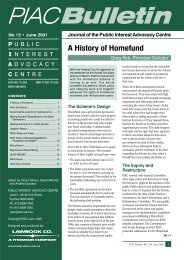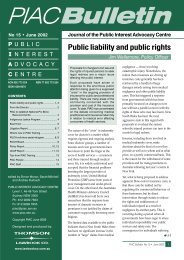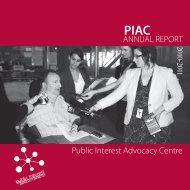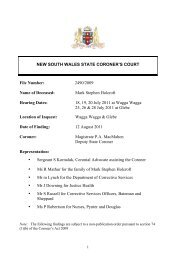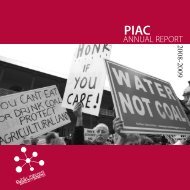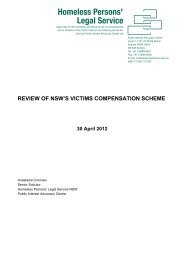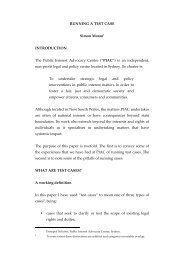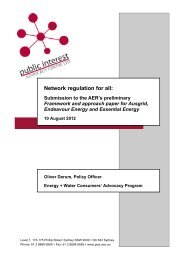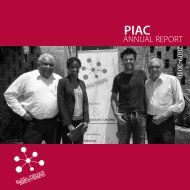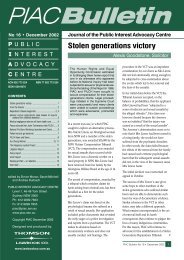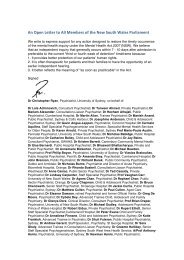PIAC Bulletin - Public Interest Advocacy Centre
PIAC Bulletin - Public Interest Advocacy Centre
PIAC Bulletin - Public Interest Advocacy Centre
Create successful ePaper yourself
Turn your PDF publications into a flip-book with our unique Google optimized e-Paper software.
FREEDOM OF INFORMATION<br />
Australian military was also concerned<br />
about who was the Detaining Power.<br />
A document prepared for General<br />
Cosgrove notes: “Defence may find if<br />
difficult, although not impossible, to<br />
coherently explain that AS was not<br />
the Detaining Power”. This document<br />
highlights that the large number of<br />
captives (66 men) “places pressure on<br />
the credibility (visually, if not legally)<br />
of asserting that the sole US member<br />
attached to the AS SF element,<br />
formally effected the detention.”<br />
By drawing on public statements,<br />
media reports, and documents<br />
released under FOI laws, <strong>PIAC</strong> has<br />
pieced together many of the details<br />
surrounding Mr Mahmud’s death.<br />
It is a death the Australian<br />
Government tried to keep hidden.<br />
<strong>PIAC</strong>’s work in this case has also<br />
highlighted that the Australian<br />
Government’s refusal to accept legal<br />
responsibility for the capture and<br />
detention of the 66 men in Iraq is on<br />
shaky legal ground. Clearly, FOI laws<br />
are an indispensible tool for holding<br />
governments to account.<br />
Government moves a step closer to anti-torture protocol<br />
On 28 February, the Federal<br />
Government tabled in Parliament<br />
a National <strong>Interest</strong> Analysis that<br />
proposes Australia ratify the United<br />
Nations Optional Protocol to the<br />
Convention against Torture (OPCAT).<br />
‘Torture is wholly inconsistent with the<br />
Australian Government’s fundamental<br />
responsibility to protect the rights and<br />
dignity of all individuals.<br />
‘Ratifying OPCAT will send a strong<br />
message both within Australia and<br />
internationally that Australia takes its<br />
human rights obligations seriously,’<br />
Attorney-General Nicola Roxon said.<br />
The tabling of the National <strong>Interest</strong><br />
Analysis is an important step towards<br />
the ratification of OPCAT.<br />
If OPCAT is ratified, Australian prisons,<br />
police stations, juvenile detention<br />
Iraq action ... Australia refused to accept legal responsibility for 66 detainees. Inset: The Sydney<br />
Morning Herald reports on a previously classified US memo.<br />
centres, immigration detention centres<br />
and secure mental health facilities<br />
will be independently monitored and<br />
inspected to ensure they comply with<br />
the international treaty standards.<br />
In December 2011, <strong>PIAC</strong> and 28 other<br />
organisations including Amnesty<br />
International Australia and Civil<br />
Liberties Australia co-signed a letter<br />
to the Attorney-General, urging the<br />
ratification of OPCAT. The National<br />
<strong>Interest</strong> Analysis refers directly to this<br />
letter.<br />
The Joint Standing Committee on<br />
Treaties will now consider OPCAT<br />
and will report on 28 June 2012.<br />
Submissions responding to the<br />
National <strong>Interest</strong> Analysis are due<br />
on 30 March.<br />
If you can assist with <strong>PIAC</strong>’s campaign<br />
to ensure that OPCAT is ratified as<br />
soon as possible, please contact Peter<br />
Dodd at <strong>PIAC</strong> on (02) 8898 6523<br />
or at pdodd@piac.asn.au.<br />
Photo: Flikr/.M Photo: Flikr/Pedro Moura Pinheiro<br />
www.piac.asn.au<br />
11




